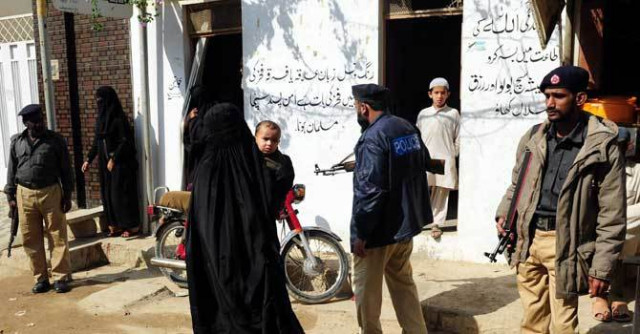Beating polio: In Isloo, no vaccination drive without security
Staff previously received threats; drive already delayed due to long march, Eid.

A burqa-clad woman holds her child as she walks past police-men outside a polio vaccination center in Karachi on January 8, 2013. PHOTO: AFP/ FILE
Islamabad’s first anti-polio drive for 2013 will only kick off if proper security is provided to polio workers. The drive, already delayed from January 14 because of security issues related to Tahirul Qadri’s long march, could disturb the National Emergency Action Plan for Polio Eradication 2013, according to officials privy to the information.
The plan — which is all set to be announced by the government — aims at interrupting poliovirus transmission in the country by the end of this year by focusing on the low transmission season.
To top it off, the official said that according to the 2013 schedule, two anti-polio drives were scheduled to be carried out in January, which is improbable given that only 10 days remain in the month. He was also concerned by the number of children who came to Islamabad from various high-risk districts as part of the long march.
“The polio virus spreads through contamination of food or water with the stool of an infected person. At the sit-in site, there was no proper arrangement for restrooms, especially for children. Many defecated under the open skies and diapers were not being properly discarded,” he said.

Directorate of Health Services (DHS) Director Dr Hassan Urooj said that the anti-polio drive in the capital will only begin when polio vaccinators are assured their security will be ensured.
He said that some of the vaccinators got threats a few weeks back, which have worried them and made them apprehensive about engaging in fieldwork.
He said that if security will be provided, the anti-polio drive can be expected to start in the last week of this month, since the upcoming weekend will see law enforcement officials tied up with Eid Miladun Nabi.
Dr Urooj further said that the DHS has also written to the federal Expanded Programme on Immunisation (EPI) requesting support in logistics, vaccines and training to carry out an anti-measles campaign in the capital after the anti-polio drive.
“For the anti-measles campaign, there is an acute shortage of vaccinators, as we have only 12 vaccinators for urban Islamabad, all of whom are already over burdened with anti-polio campaigns,” he said, adding that the CDA is planning to hire more vaccinators, who will need to be trained to administer the anti-measles vaccine.
Published in The Express Tribune, January 20th, 2013.












1724319076-0/Untitled-design-(5)1724319076-0-208x130.webp)






COMMENTS
Comments are moderated and generally will be posted if they are on-topic and not abusive.
For more information, please see our Comments FAQ